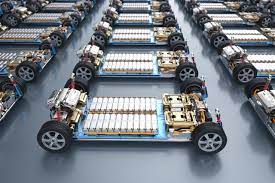Lithium-ion (Li-ion) batteries have become an integral component of modern technology, powering a vast array of devices and systems that form the backbone of contemporary life. Their widespread adoption can be attributed to their superior energy density, rechargeability, and longevity compared to other battery technologies. This article explores the ubiquitous role of lithium-ion batteries across various sectors, underscoring their significance in the digital and renewable energy revolutions.

Portable Electronics
The rise of portable electronics — smartphones, laptops, tablets, and wearable devices — has been largely enabled by the compact, lightweight, and long-lasting power offered by Li-ion batteries. These batteries have made it possible to design slim, powerful devices that can operate for hours or even days on a single charge, meeting the demands of modern, mobile lifestyles.
Electric Vehicles (EVs)
Li-ion batteries have been pivotal in the automotive industry’s shift towards electric vehicles. Their high energy density and efficiency have made it feasible to produce EVs with competitive range and performance. As battery technology continues to advance, costs are decreasing, making electric vehicles increasingly accessible to the general public and playing a critical role in reducing greenhouse gas emissions from the transportation sector.
Renewable Energy Storage
The integration of renewable energy sources like solar and wind into the power grid is a critical step towards a sustainable energy future. Li-ion batteries are essential in this process, providing efficient storage solutions that help mitigate the intermittent nature of these energy sources. By storing excess energy generated during peak production times and releasing it when demand is higher, lithium-ion batteries enable a more stable and reliable supply of renewable energy.
Medical Devices
In the healthcare sector, Li-ion batteries power a wide range of medical devices, from portable diagnostic equipment to wearable health monitors and implantable devices like pacemakers. The reliability and long life of these batteries are crucial for devices that require consistent performance to ensure patient health and safety.
Space Exploration
Li-ion batteries also play a key role in space exploration, powering satellites, rovers, and other spacecraft. Their high energy density and ability to withstand extreme temperatures and radiation levels make them ideal for the harsh conditions of space. These batteries enable long-term missions and the continuous operation of scientific instruments millions of miles from Earth.
Unmanned Aerial Vehicles (UAVs)
The proliferation of drones for commercial, recreational, and research purposes is another testament to the versatility of Li-ion batteries. Their ability to provide high power-to-weight ratios is essential for the operation of unmanned aerial vehicles (UAVs), allowing for longer flight times and greater payload capacities.
Challenges and Future Directions
Despite their widespread adoption, Li-ion batteries are not without challenges. Issues such as resource scarcity, environmental concerns related to mining and disposal, and the risk of thermal runaway highlight the need for continued innovation in battery technology. Research is focused on developing more sustainable materials, improving safety standards, and enhancing recycling processes to address these challenges. Additionally, the exploration of alternative battery technologies, such as solid-state and lithium-sulfur batteries, promises to further expand the capabilities and applications of energy storage systems.
Conclusion
The ubiquitous role of lithium-ion batteries in modern technology is a testament to their unparalleled combination of energy density, rechargeability, and longevity. As society continues to evolve towards greater mobility, sustainability, and digital connectivity, the importance of Li-ion batteries is only set to increase. Through ongoing research and development, the future of lithium-ion battery technology holds the promise of even greater advancements, further transforming the way we live, work, and interact with the world around us.
